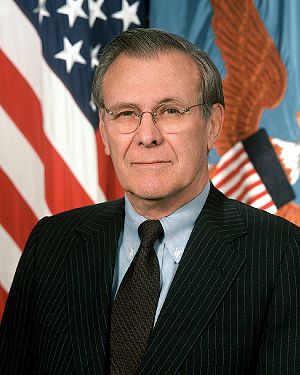Donald Rumsfeld
Donald Henry Rumsfeld (b. July 9, 1932) was the Secretary of Defense under President Gerald Ford from 1975 to 1977 and later George W. Bush from 2001 to 2006. When he began his first term as defense secretary, he was the youngest person in U.S. history to hold that position; when he left office at the end of his second term, he was the oldest.
Born in Chicago on July 9, 1932, Donald Rumsfeld received his bachelor's degree in 1954 from Princeton University, where he captained the wrestling team. After serving three years (1954–57) in the United States Navy as an aviator and flight instructor, he worked as a congressional aide in Washington, D.C., and as an investment banker in Chicago. In 1962 he won election to the United States House of Representatives from the North Shore district of Illinois; he was reelected in 1964, 1966, and 1968.
Rumsfeld gave up his safe congressional seat the following year to serve at the Office of Economic Opportunity and at the White House in the administration of President Richard Nixon. From 1973 to 1974 Rumsfeld was in Brussels, Belgium, as U.S. ambassador to the North Atlantic Treaty Organization (NATO).
In August 1974, after Nixon resigned, Rumsfeld was summoned back to Washington to head President Ford's transition team. He then served as Ford's chief of staff until nominated and confirmed as Secretary of Defense. While at the Department of Defense he campaigned vigorously for increased defense spending, took an active role in Strategic Arms Limitation Talks (SALT) with the Soviet Union, and made his own test flight in an early version of the B-1 bomber.
After Ford lost the 1976 presidential election, Rumsfeld returned to the private sector, applying his tough-minded management style as chief executive officer, president, and chairman of the G. D. Searle pharmaceutical firm and in subsequent corporate assignments. He continued to speak out on defense issues and was a voice on several prestigious national commissions. When George W. Bush was elected president in 2000, his transition manager, Vice-President-elect Dick Cheney, who had been Rumsfeld's protégé in both the Nixon and Ford administrations, recruited Rumsfeld to serve a second term as defense secretary.
Quickly confirmed by the United States Senate, Rumsfeld took office in January of 2001. During his first seven months on the job, he sought, amid opposition, to restructure the military to meet the needs of the post-Cold War era. After al-Qaeda terrorists attacked the U.S. on September 11, using hijacked aircraft to strike Defense Department headquarters at the Pentagon and to destroy the World Trade Center, Rumsfeld was an outspoken champion of the Bush Administration's War on Terror. He oversaw the defeat of the Taliban regime in Afghanistan, which had aided al-Qaeda, and he presided over the largest military buildup since the early 1980s, disarming some media skeptics with his confidence and candor.
Once the war with the regime of dictator Saddam Hussein began, the rapid success of U.S.-led forces in ousting Saddam appeared to vindicate Rumsfeld's insistence on sophisticated weaponry, strategic flexibility, and preemptive action. However, after major combat operations ended, and U.S. liberation forces began to face daily attacks from Saddam supporters and other terrorists, critics charged that Rumsfeld had underestimated the problems involved. The criticism intensified in April 2004, with the release of photographs providing evidence of pranks carried out on Iraqi terrorist prisoners by a handful of U.S. military personnel at Baghdad's Abu Ghraib prison during the fall of 2003. Rumsfeld acknowledged in early 2005 that he had twice offered to resign after the Abu Ghraib revelations, but that President Bush had rejected the offers.
For most of 2005 and 2006, President Bush continued to back Rumsfeld while a growing number of liberals called for his departure. Finally, on November 8, 2006, the day after an election in which Democrats had captured control of Congress, Bush announced that Rumsfeld would step down; named to replace him was Robert Gates, who had headed the Central Intelligence Agency during the presidency of George H. W. Bush.
